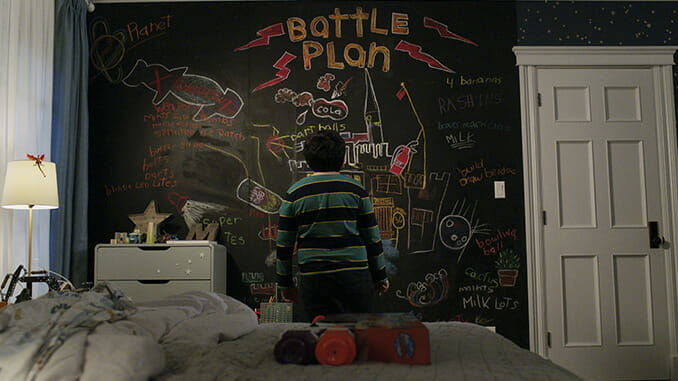Home Sweet Home Alone Is, in Fact, a Movie That Exists
Images courtesy of Disney+
Home Sweet Home Alone doesn’t need a purpose to exist. It doesn’t need to exist at all, but necessity isn’t a prerequisite for anything anymore. Ontologically, best to just accept this, all of this. Happy Disney+ Day.
Regardless, Home Sweet Home Alone insists on justifying itself. No one is asking why, as 2021 draws to a close, Disney+ continues to stripmine every poorly defined ghost of an IP, especially one which three sequels have already embarrassed into obscurity. We already know the answer. Two guys who know about attempting to inject life into an obsolete institution, SNL mainstays Mikey Day and Streeter Seidell (and likely a writers room) “broke” the story by taking cues from Halloween or Highlander and pretending the third, fourth and fifth entries in the storied Home Alone franchise don’t exist. Because people need canonical connective tissue in their favorite holiday movies in order to sleep at night, we’re re-introduced to Buzz McCallister (Devin Ratray), once a shitty pig asshole bully of an older brother and now a shitty pig asshole cop in the same wealthy Chicago suburb where 30 years earlier his parents left his eight-year-old brother home alone. Twice. You may call it absurd that the exact same thing seems to be happening for a third time in the exact same neighborhood—that perhaps this is happening in every suburb in America, parents so estranged from their children and overwhelmed by modern life that they simply lose track of them, and this cycle repeats, its patterns beyond our ken, generations doomed to abandon the next, over and over until God finally and permanently abandons us—but Day and Seidell are too occupied struggling to explain how any of this garbage makes any sense in 2021 to consider why it doesn’t, beyond, say, the existence of cell phones and the fact that you can talk to your house now.
Let’s get a little personal for a moment, because this movie sucks shit anyway. My affection for 1990’s Home Alone is the kind that feels like currency today, the sort of unique love that can work as shorthand for taste. I’d venture that its perfectly pitched tone between Bugs Bunny-like sociopathy and schmaltzy John Hughes warmth particularly vaulted Joe Pesci’s full-bodied performance as Harry into an S-tier gallery of mean-mugs, completing his ascent as one of the greatest actors of his generation—and watching it now, in the shadow of The Irishman, it can’t be clearer—but I am also not able to extricate Daniel Stern’s world-shaking squeal, tarantula on his face, from my fondest and foundational memories. I am Marcello Mastroianni at the end of 8 ½ with my life’s most beloved characters circling me—and there is Marv screaming, and Harry with his head on fire, and Kevin McCallister (Macaulay Culkin) declaring, “This is my house, I have to defend it,” and even Uncle Frank (Gerry Bamman) staring at me, snarling, “Look what you did, you little jerk,” all holding hands and spinning around me and celebrating the impeccable sense of humor of a 38-year-old man.
The predominant quality of this reboot, as expected, is its veneer of wokeness—one can’t tell if it legitimately cares about progressive ideas, but it does “refresh” the story of two scum-bums who fail in grand fashion to rob a rich family lucky enough to spend Christmas in Paris and unconcerned about their two-car garage being wide open for a week because the family’s precocious youngest child threw a hissy fit after not getting any cheese pizza. Now, the criminals must be beleaguered parents, transmuting some of the anxiety of Catherine O’Hara’s Kate McCallister into the increasingly violent problems of Jeff (Rob Delaney) and Pam (Ellie Kemper) McKenzie, who are only trying to rob a rich family to get back the rare porcelain doll that will apparently save them from having to sell the modest but very nice ranch home in the aforementioned wealthy Chicago suburb for which, in this market, they would surely and easily get close to three times what they paid for it in the early aughts. Meanwhile, 10-year-old dickweed Max Mercer (Archie Yates) finds a worse movie than Jojo Rabbit to inhabit, meeting and being a mouthy little shit to Jeff during one of the McKenzies’ open houses, which later leads to Jeff assuming that Max stole the doll (even though anyone who has ever seen a movie knows that didn’t actually happen) and staking out Max’s lavish family mansion, discovering that Max has been left behind by his Tokyo-bound family. You know where this goes. This kid sucks. And since this time we’re supposed to sympathize with the bad guys, when Max inevitably submits Jeff and Pam to a menagerie of pain, we’re more disturbed and befuddled than filled with joy at witnessing brilliant character actors gurn and get their skulls caved in by appliances.
-

-

-

-

- Curated Home Page Articles By Test Admin October 21, 2025 | 3:10pm
-

- Curated Home Page Articles By Test Admin October 21, 2025 | 2:57pm
- Urls By Test Admin October 21, 2025 | 2:57pm
- Curated Home Page Articles By Test Admin October 21, 2025 | 2:55pm
-

-

-

-

-

-

-

-

-

-

-

-

-

-

-

-

-

-

-

-

-

-

-

-

-

-

-

-

-

-

-




































